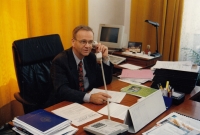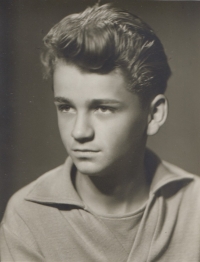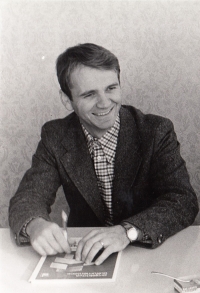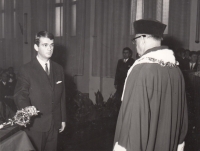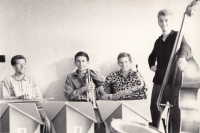I had the opportunity to tell the Soviet soldiers that we hadn’t liked them here at all

Download image
Petr Košacký was born on 12 April 1945 in Ostravice. His father, Karel Košacký, was a member of Defence of the Nation during the Second World War and supported the partisans of the 1st Czechoslovak Brigade of Jan Žižka in Ostravice. Because his father worked in forests, the family moved frequently. They lived in the village of Mírov, in Špindlerův Mlýn and in Králíky. In 1958, during the background checks, his father was nearly dismissed from his job. His previous activity during the war saved him. Petr Košacký’s parents led him to faith in God, he attended religion lessons and sang in the church choir. But this damaged reference needed for his admission to secondary school. Thus he was only admitted for further studies after an appeal and the intervention made by his mother. In 1962 he graduated from the Secondary General Education School (SVVŠ) in Bruntál. He did not receive a recommendation for further studies at university and therefore started to work at a construction site in Brno. After a year, he re-applied for university studies, but this time from a working-class position, and so nothing prevented his admission to the Faculty of Construction at the Brno University of Technology. There he also experienced the year 1968. During the Prague Spring he took part in several demonstrations and after August 1968 he protested against the occupying armies. After graduation he worked in Ostrava. At that time, he also married Bohumila Loukotová, a graduate doctor whom he knew from his studies. He then joined the Jeseník Ore Mines and moved to the town with his wife. Their son Ondřej was born there in 1972 and four years later their daughter Kateřina. Although Petr Košacký regularly listened to Radio Free Europe, he did not publicly express any anti-regime views. In 1989, he signed the petition Several Sentences. During the Velvet Revolution, he organized the general strike at the Ore Mines, and was one of the founding members and spokespersons of the Civic Forum in Jeseník. In February 1990, he was co-opted as chairman of the town’s National Committee. In this post he dealt with the withdrawal of the Soviet garrison from the town. In the first free elections, the electoral votes brought him to the mayor’s seat . After leaving the town hall, he spent some time as a consultant and then became the director of the Jeseník Museum of Local History. At the time of the recording in 2022, he was still living in Jeseník.
